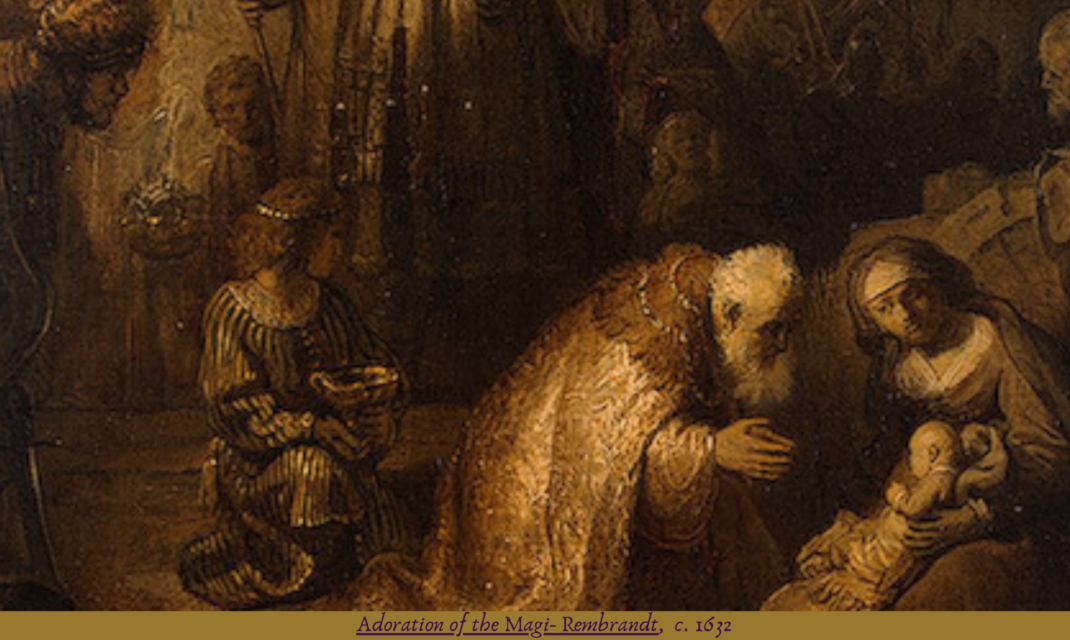Photo credit: Fra Angelico and Fra Filippo Lippi c. 1440/1460 – The Adoration of the Magi – Google Art Project
“Wise men from the east came to Jerusalem.” How we would love to know more! Where did they come from? Were they all from the same place? How long did they have to travel? What was the nature of the art by which they interpreted a star appearing in the heavens to mean that a new king was born to a tiny, insignificant Roman province? For that matter, what did they think he would be king of? They say he is to be king of the Jews, but why should they care? What prophecies of their people was this child the answer to?
The Scriptures leave us to wonder at all of these things. We only know that they came far, and that they were not of the Jewish people. They therefore represent the calling of the Gentiles, who would be folded into the new people God was making for Himself, a people without ultimate earthly allegiance. In this way they are perhaps most like us, who are either Gentiles, or Jews sojourning in a place far distant in time, if not in space.
Look at their faith and devotion! It can be safely surmised that their journey took months. It is the greatest pilgrimage recorded in the Bible. Why did they do it? They did it because they somehow knew this was a once in a lifetime opportunity, an event that would reshape history, and they couldn’t stand the thought of being left out of it. They can have had no real idea of the nature or scope of the reshaping that would take place: if even God’s people, with their clear revelations, could not know, then the vaguer prophecies of pagan peoples would fare no better. But they knew all the same that this was the start of something magnificent, and they were so very right.
While it can be frustrating to know so little, the lack of information about who they are and where they came from is a feature, not a flaw. Because we do not know where they came from or even, in the most basic sense, who they were, we cannot analyze them. We cannot judge whether they were reading the prophecies right, or were terribly mistaken; we cannot judge whether they brought a reasonable or miserly offering based on their total wealth; we cannot judge whether there was anything of self-interest in it. No, our entire focus is shifted to their actions: they travelled far in faith, in response to a call that either they alone heard or they alone heeded. They speak to each of us, they represent each of us, for we all start far from the household of God in some far-flung country, and we all must make our own journey to Bethlehem. And we, living when we do in time, do not arrive on that first night with the shepherds whose faces still shone with reflected angelic glory. No, we arrive later: it is the 12th day of Christmas for us, the day the Church has named Epiphany, when the glory blazes forth again. This time it is not the angelic message, but our gift of self that summons forth the flash of glory, that makes known what has always been true: the kingship and lordship of this most precious human. The wise men declared him king when they gave him princely gifts; we declare him lord when we give him ourselves.
Well, what happens to the wise men after that? They return to their own country. That’s all we get: we know as little of their going as we knew of their coming. Do they go back changed, rejoicing and spreading the news of what they have seen? Or do they quickly forget, returning to their old lives? Or is it something in the middle: things go on mostly the same, but there are these moments when they are overtaken by the mystery and wonder of what they have seen. Do they, like Mary, treasure up these things in their hearts, and take them out at quiet moments to gaze upon them again? We cannot know.
And this too is a feature, because the important question is not what happened to the wise men who represent us, it is what will happen to us, whom they represent. The question as we move through the twelve day Christmas season is this: “What will our return to our own country look like? Will we be changed forever, coming back with songs of joy on our lips to tell of what we have seen? Or will we be pensive, quiet, pondering what it all means? Or will we, God forbid, just go on doing what we did before, forgetting the experience of resting with the Holy Family? This is the question that ought to drive us as we celebrate the birth of Christ, and that ought to season our every feast.
If you enjoyed this article,
please consider Junius’s Advent companion resources below!

Junius Johnson is an independent scholar, teacher, musician, and writer. He is the executive director of Junius Johnson Academics, through which he offers innovative classes for both children and adults that aim to marry the sense of wonder with intellectual rigor. An avid devotee of story, he is especially drawn to fantasy, science fiction, and young adult novels. He performs professionally on the french horn and electric bass. He holds a BA from Oral Roberts University (English Lit), an MAR from Yale Divinity School (Historical Theology), and an MA, two MPhils, and a PhD (Philosophical Theology) from Yale University. He is the author of 5 books, including The Father of Lights: A Theology of Beauty. An engaging speaker and teacher, he is a frequent guest contributor to blogs and podcasts on faith and culture, and is a member of The Cultivating Project. Explore his work at juniusjohnson.com.

